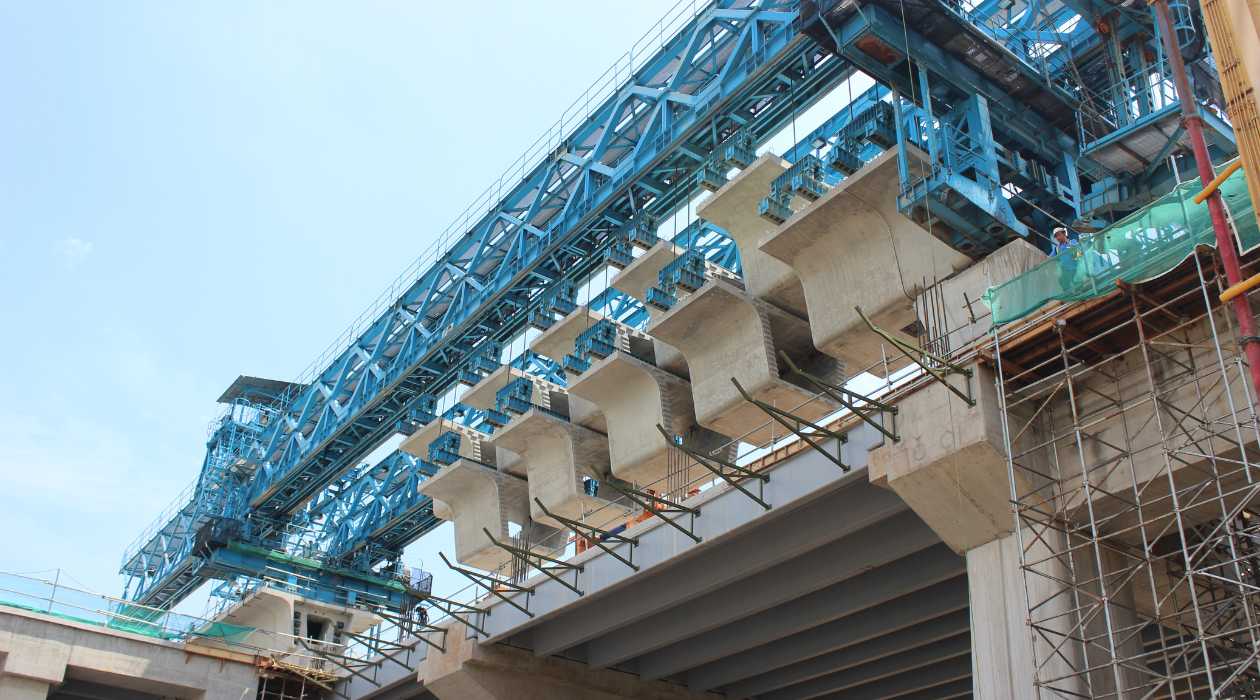Home>diy>Building & Construction>What Are Construction Bonds


Building & Construction
What Are Construction Bonds
Modified: December 7, 2023
Learn more about construction bonds and how they protect both contractors and clients in the building construction industry.
(Many of the links in this article redirect to a specific reviewed product. Your purchase of these products through affiliate links helps to generate commission for Storables.com, at no extra cost. Learn more)
Introduction
When it comes to construction projects, there are various risks involved that can impact the successful completion and financial well-being of all parties involved. This is where construction bonds come into play. Construction bonds provide a layer of security and assurance for project owners, contractors, and suppliers, ensuring that the project is completed as agreed and that all parties are compensated fairly.
In this article, we will explore the world of construction bonds, their definition, types, importance, and how they work. We will also discuss the eligibility requirements, costs, benefits, and risks associated with construction bonds. By the end, you will have a comprehensive understanding of construction bonds and their significance in building construction projects.
So, let’s dive in and discover everything you need to know about construction bonds.
Key Takeaways:
- Construction bonds provide financial security, contractual compliance, and risk mitigation for all parties involved in construction projects, ensuring successful project completion and promoting fair competition.
- Common misconceptions about construction bonds, such as their cost and complexity, are debunked, emphasizing their accessibility, value, and importance for projects of all sizes.
Read more: What Is Bid Bond In Construction
Definition of Construction Bonds
Construction bonds, also known as contract bonds, are three-party agreements between the project owner (known as the obligee), the contractor (known as the principal), and a surety company. These bonds serve as a guarantee that the contractor will fulfill their contractual obligations and meet their financial responsibilities throughout the construction project.
Construction bonds act as a form of insurance, protecting the project owner and other stakeholders from potential financial losses due to contractor default, non-performance, or other breaches of contract. They provide a level of security and confidence to the obligee that the project will be completed as specified in the contract, even if the contractor encounters financial difficulties or fails to deliver.
It’s important to note that construction bonds are different from traditional insurance policies. While insurance protects against unforeseen events, such as accidents or property damage, construction bonds specifically address the contractual obligations and performance of the contractor.
There are three primary types of construction bonds:
- Performance Bonds: These bonds ensure that the contractor will complete the project according to the terms and conditions of the contract. If the contractor fails to perform, the bond guarantees compensation to the project owner for the costs of completing the unfinished work or hiring a new contractor.
- Payment Bonds: These bonds provide assurance to subcontractors, suppliers, and laborers that they will be paid for their work or materials on the project. If the contractor fails to make the required payments, the bond ensures that the affected parties will receive compensation.
- Bid Bonds: These bonds are submitted by contractors as part of the bidding process for a construction project. They guarantee that the contractor will enter into a contract and provide the necessary performance and payment bonds if they are awarded the project.
Construction bonds are typically required for public construction projects but are also common in private projects where the owner wants to mitigate the risks associated with contractor default or non-performance.
Now that we have a clear understanding of what construction bonds are and their various types, let’s explore their importance and how they work in more detail.
Types of Construction Bonds
Construction bonds play a crucial role in ensuring the successful completion of construction projects. These bonds come in different types, each serving a specific purpose. Let’s take a closer look at the three primary types of construction bonds:
- Performance Bonds: Performance bonds provide assurance to the project owner that the contractor will complete the project as agreed upon in the contract. In the event that the contractor fails to fulfill their obligations, the bond guarantees compensation to the project owner. This compensation can be used to cover the costs of hiring a new contractor to complete the work or any additional expenses incurred due to the contractor’s non-performance.
- Payment Bonds: Payment bonds provide protection to subcontractors, suppliers, and laborers involved in the construction project. These bonds guarantee that they will receive payment for the services they provide or the materials they supply. If the contractor fails to make the necessary payments, the bond ensures that these parties will be compensated for their work or materials.
- Bid Bonds: Bid bonds are typically required in the bidding process for a construction project. Contractors submit bid bonds to demonstrate their financial stability and commitment to entering into a contract if they are awarded the project. The bid bond guarantees that the contractor will provide the necessary performance and payment bonds if they win the bid. In case the contractor fails to fulfill this commitment, the bid bond serves as a form of compensation for the project owner.
These three types of construction bonds work in tandem to provide comprehensive protection and ensure the successful completion of construction projects. They mitigate financial risks for all parties involved and uphold the integrity of the contractual agreements.
It’s worth noting that construction bonds are typically obtained through a surety company, which acts as a third-party guarantor for the contractor. The surety company assesses the financial stability and track record of the contractor before issuing the bond. This evaluation process ensures that only reputable contractors who meet certain criteria can secure construction bonds.
Now that we understand the different types of construction bonds, let’s delve into their importance and how they function within the construction industry.
Performance Bonds
Performance bonds are a vital component of construction projects as they provide assurance to project owners that contractors will fulfill their contractual obligations. These bonds act as a guarantee that the contractor will complete the project as agreed upon in the contract, ensuring that the project owner is protected in the event of non-performance or contractor default.
When a contractor is awarded a construction project, they are often required to obtain a performance bond from a surety company. The purpose of the performance bond is to provide financial compensation to the project owner if the contractor fails to fulfill their obligations. This compensation can be used to cover any losses or additional costs incurred due to the contractor’s non-performance.
Performance bonds are beneficial for project owners as they provide several key advantages:
- Financial Security: Performance bonds provide project owners with financial security in case the contractor fails to complete the project or breaches the terms of the contract. The bond ensures that funds are available to cover the costs of completing the project or hiring a new contractor.
- Contractual Compliance: Performance bonds enforce the terms and conditions stated in the contract. Contractors are motivated to comply with the agreed-upon specifications and deadlines to avoid potential financial penalties or compensation claims outlined in the bond.
- Risk Mitigation: By requiring performance bonds, project owners mitigate the risk of non-performance or contractor default. This provides them with peace of mind and reduces the uncertainties associated with construction projects.
- Quality Assurance: Performance bonds encourage contractors to maintain a high level of quality in their work. If the contractor fails to meet the specified standards, corrective actions can be taken, and the bond can be utilized to rectify any deficiencies.
Contractors must meet certain eligibility requirements to obtain a performance bond. These requirements typically include demonstrating financial stability, a proven track record of successful project completion, and adherence to industry standards and regulations. The surety company evaluates these factors before issuing the performance bond.
In the event of non-performance or contractor default, the project owner can make a claim against the performance bond. The surety company will investigate the claim and, if deemed valid, provide the necessary compensation to the project owner. The surety company may then seek reimbursement from the contractor for the paid amount, including any additional costs incurred.
Overall, performance bonds are essential in the construction industry as they provide confidence, financial protection, and contractual compliance for project owners. They ensure that construction projects are completed as agreed upon, promoting trust and integrity within the industry.
Payment Bonds
Payment bonds are a crucial component of construction projects as they provide protection to subcontractors, suppliers, and laborers by ensuring they receive payment for their work or materials. These bonds act as a financial guarantee that the contractor will fulfill their obligations to pay all parties involved in the construction project, preventing potential non-payment issues.
When a contractor is awarded a construction project, they may be required to obtain a payment bond. The payment bond provides assurance to subcontractors, suppliers, and laborers that they will be paid for the services they provide or the materials they supply. This bond serves as a safeguard against any potential financial hardship or non-payment situations.
Payment bonds offer several key advantages for all parties involved:
- Protection for Subcontractors and Suppliers: Payment bonds ensure that subcontractors and suppliers will receive timely payment for their work or materials. This promotes a fair and equitable distribution of funds within the construction project and reduces the risk of financial strain on smaller businesses.
- Encouragement of Participation: By requiring payment bonds, project owners can attract a wider pool of subcontractors and suppliers, as they have the assurance of being paid for their contributions. This fosters competition and promotes a competitive bidding process.
- Risk Mitigation: Payment bonds mitigate the risk of non-payment or financial difficulties on the part of the contractor. Subcontractors and suppliers can proceed with confidence, knowing that they have a financial safety net in place.
- Dispute Resolution: In the event of disputes regarding payment, payment bonds provide a mechanism for resolution. Subcontractors and suppliers can make a claim against the payment bond, allowing for a fair and impartial investigation of the issue.
Like performance bonds, contractors must meet certain eligibility requirements to obtain a payment bond. These requirements typically include financial stability, a proven track record of fulfilling payment obligations, and adherence to industry standards and regulations. The surety company assesses the contractor’s financial capacity and ability to fulfill payment obligations before issuing the bond.
In the event of non-payment, subcontractors and suppliers can make a claim against the payment bond. The surety company will investigate the claim and, if valid, provide the necessary compensation to the affected parties. This ensures that subcontractors, suppliers, and laborers are not left unpaid due to the contractor’s financial difficulties or non-payment.
Payment bonds promote fairness, accountability, and financial security within the construction industry. They establish a reliable system for subcontractors, suppliers, and laborers to receive payment for their contributions, fostering trust and stability throughout the construction project.
Read more: How Does A Bond Work In Construction
Bid Bonds
Bid bonds are an essential aspect of the construction bidding process. They are submitted by contractors as part of their bid package to demonstrate their financial stability and commitment to entering into a contract if they are awarded the project. Bid bonds provide assurance to project owners that the contractor has the capacity to fulfill the contract and provide the necessary performance and payment bonds.
When a construction project is put out for bid, contractors interested in securing the project submit their bids, which include a bid bond. The purpose of the bid bond is to guarantee that the contractor will undertake the project if their bid is accepted. It acts as a commitment from the contractor to enter into a contract and fulfill the contractual obligations specified in the bid.
Bid bonds offer several advantages for project owners:
- Financial Checking: Bid bonds allow project owners to assess the financial stability and capability of contractors during the bidding process. The surety company evaluates the contractor’s financial standing before issuing the bond, ensuring that only financially viable and reliable contractors are considered.
- Contractual Commitment: By requiring bid bonds, project owners ensure that contractors are committed to entering into a contract if their bid is accepted. This provides assurance that the contractor will follow through with their proposed plans and fulfill their obligations.
- Project Completion: Bid bonds reduce the risk of contractors winning bids without the intention or capability to complete the project. The financial commitment of the bid bond serves as a deterrent for contractors who may otherwise submit unrealistic bids or lack the necessary resources for successful project completion.
- Protection for Project Owners: Bid bonds provide a level of protection for project owners in case a contractor fails to fulfill their commitment after winning the bid. If a selected contractor refuses to sign the contract or defaults on their obligations, the project owner can make a claim against the bid bond for compensation.
If a contractor’s bid is accepted, the bid bond is typically replaced by a performance bond and payment bond. These bonds provide the necessary guarantees to ensure project completion and protect the interests of all parties involved.
If a contractor fails to fulfill their commitment, such as refusing to sign the contract or perform the specified work, the project owner can make a claim against the bid bond for financial compensation. This protects the project owner from any financial losses or damages resulting from the contractor’s non-compliance.
Bid bonds are crucial in the construction industry as they promote fair competition, financial accountability, and project completion. They provide project owners with confidence and security during the bidding process, ensuring that only qualified and committed contractors are considered for the project.
Surety Bonds
Surety bonds are an integral part of the construction industry, providing financial protection and assurance to project owners, subcontractors, suppliers, and other parties involved in construction projects. Surety bonds act as a guarantee that the contractor will fulfill their contractual obligations, ensuring that all parties are protected from potential financial losses.
Unlike other types of bonds, surety bonds involve three parties: the project owner (obligee), the contractor (principal), and the surety company (the guarantor). The surety company is a third-party that issues the bond and assumes the responsibility of ensuring that the contractor meets their obligations.
Surety bonds offer several key advantages:
- Financial Protection: Surety bonds provide financial protection to project owners and other parties involved in construction projects. In the event of contractor default, non-performance, or non-payment, the surety company steps in to provide compensation or arrange for the completion of the project, preventing financial losses.
- Contractual Compliance: Surety bonds ensure that contractors adhere to the terms and conditions specified in the contract. Contractors are motivated to fulfill their obligations to avoid potential claims against the bond, protecting the project owner’s interests.
- Quality Assurance: Surety bonds promote high-quality workmanship and adherence to industry standards. Contractors are incentivized to maintain a high level of quality in their work to avoid claims and potential repercussions from the surety company.
- Conflict Resolution: Surety bonds provide a mechanism for resolving disputes between project owners and contractors. If issues arise during the project, the surety company can intervene and facilitate a resolution, ensuring the project progresses smoothly.
The surety company plays a crucial role in the issuance of surety bonds. Before issuing a bond, the surety company evaluates the contractor’s financial stability, experience, track record, and capacity to fulfill their obligations. This evaluation process minimizes the risk for project owners and demonstrates the contractor’s credibility and capability. Should the contractor fail to meet their obligations, the surety company is responsible for compensating the project owner or arranging for the completion of the project.
It’s important to note that surety bonds are not insurance policies. Surety companies assess the risk of providing the bond based on the contractor’s financial strength and track record. In the event of a claim, the surety company expects reimbursement from the contractor, including any additional costs incurred.
Surety bonds play a pivotal role in safeguarding the interests of all parties involved in construction projects. They provide financial protection, promote contractual compliance, and ensure the successful completion of projects, fostering trust and confidence within the construction industry.
Importance of Construction Bonds
Construction bonds play a vital role in the construction industry, providing a range of benefits and safeguards for project owners, contractors, subcontractors, suppliers, and other stakeholders. Here are some key reasons highlighting the importance of construction bonds:
- Financial Security: Construction bonds offer financial protection to project owners by ensuring compensation in the event of contractor default, non-performance, or non-payment. They provide a safety net that covers the costs associated with completing the project or addressing financial losses.
- Risk Mitigation: Construction projects are prone to risks and uncertainties, including financial instability of contractors, delays, and other unforeseen circumstances. Construction bonds mitigate these risks by ensuring that contractors have the capacity and resources to fulfill their contractual obligations, thus reducing the likelihood of project disruptions or failures.
- Contractual Compliance: Construction bonds ensure contractors adhere to the terms and conditions specified in the contract. Contractors are incentivized to fulfill their obligations, promoting accountability and maintaining the integrity of the contractual agreement.
- Payment Protection: Payment bonds within construction bonds protect subcontractors, suppliers, and laborers by ensuring they receive timely payment for their work or materials. This promotes fair and equitable compensation throughout the construction project, reducing the risk of non-payment issues.
- Quality Assurance: Construction bonds encourage contractors to maintain a high level of quality in their work to avoid potential claims and repercussions from the surety company. This commitment to quality ensures that construction projects meet the specified standards and promote the satisfaction of project owners and end-users.
- Competitive Bidding: Construction bonds, particularly bid bonds, foster fair competition in the bidding process. Project owners can evaluate bids from contractors with the assurance that firms submitting bids have been assessed for financial stability and commitment to the project. This promotes a level playing field and encourages reliable contractors to participate in the bidding process.
- Dispute Resolution: Construction bonds provide a structured mechanism for resolving disputes that may arise during the project. Surety companies can intervene, investigate claims, and facilitate resolutions, ensuring that conflicts between project owners and contractors are resolved in a fair and efficient manner.
Overall, construction bonds are essential in the construction industry as they provide financial security, contractual compliance, and risk mitigation for all parties involved. They uphold the integrity of construction projects, promote fair business practices, and contribute to the successful completion of projects. Whether it’s through performance bonds, payment bonds, bid bonds, or other types of construction bonds, their importance cannot be overstated in maintaining trust, accountability, and confidence within the construction industry.
When obtaining a construction bond, make sure to thoroughly review the terms and conditions to understand your obligations and responsibilities as a contractor. This will help you avoid any potential issues or disputes during the construction process.
How Construction Bonds Work
Construction bonds function as a form of financial assurance and protection for project owners, subcontractors, suppliers, and other stakeholders involved in construction projects. Understanding how construction bonds work is essential to grasping their role in the industry. Here’s an overview of the process:
1. Bond Issuance: The first step in obtaining a construction bond is for the contractor to apply for the bond from a surety company. The surety company evaluates the contractor’s financial stability, track record, and capacity to fulfill their contractual obligations.
2. Bond Approval: If the surety company determines that the contractor meets the requirements, they will issue the construction bond. The bond acts as a guarantee that the contractor will fulfill their obligations and provide financial compensation if they fail to do so.
3. Contractual Agreement: The contractor enters into a contractual agreement with the project owner, which outlines the terms, conditions, and specifications of the project. This includes the requirement to provide a performance bond and payment bond.
4. Performance Bond: The contractor secures a performance bond, which serves as a guarantee that they will complete the project as agreed upon in the contract. If the contractor fails to fulfill their obligations, the project owner can make a claim against the performance bond for compensation.
5. Payment Bond: The contractor also obtains a payment bond, which ensures that subcontractors, suppliers, and laborers will be paid for their work or materials on the project. If the contractor defaults on payments, affected parties can make a claim against the payment bond.
6. Project Commencement: Once the necessary bonds are in place, the construction project can commence. The contractor is responsible for executing the project according to the agreed-upon terms, quality standards, and timelines.
7. Bond Claims: In the event of non-performance, non-payment, or other breaches of contract, affected parties such as the project owner, subcontractors, or suppliers can make a claim against the appropriate bond. The surety company will investigate the claim and, if valid, provide the necessary compensation to the claimant.
8. Surety Company Involvement: The surety company plays a crucial role throughout the process. They assess the contractor’s financial standing, issue the bond, and investigate claims. If a claim is paid out, the surety company may seek reimbursement from the contractor.
9. Completion of Project: Once the project is successfully completed, all contractual obligations have been met, and any claims against the bond have been resolved, the construction bonds are no longer in effect.
It’s important to note that construction bonds are not insurance policies. They act as a financial guarantee for the completion of the project and the fulfillment of contractual obligations. The contractor remains responsible for any contractual penalties or damages resulting from non-compliance.
By understanding the functioning of construction bonds, project owners, contractors, subcontractors, and suppliers can navigate construction projects with more confidence, trust, and financial security.
Read more: How Does A Bond Work For Construction
Eligibility Requirements for Construction Bonds
Obtaining construction bonds requires meeting certain eligibility requirements. These requirements are put in place by surety companies to assess the financial stability, track record, and capacity of contractors to fulfill their contractual obligations. Meeting these requirements is essential for contractors seeking to secure construction bonds. Here are some common eligibility requirements:
- Financial Stability: Surety companies evaluate the financial health and stability of contractors before issuing construction bonds. This assessment involves examining factors such as the contractor’s creditworthiness, liquidity, cash flow, and debt-to-equity ratio. Contractors are expected to demonstrate strong financial management practices and the ability to handle the financial commitments of the project.
- Industry Experience: Contractors with a proven track record of successful project completion are more likely to meet the eligibility requirements for construction bonds. Surety companies consider factors such as the contractor’s years of experience in the industry, their portfolio of completed projects, and any relevant certifications or licenses. A history of delivering projects on time, within budget, and with a high level of quality enhances the contractor’s eligibility.
- Capacity and Resources: Contractors must demonstrate their capacity and resources to undertake and complete the construction project. This includes having access to skilled labor, equipment, and materials necessary for the successful execution of the project. Contractors should provide detailed information about their workforce, equipment inventory, and supply chain to showcase their ability to meet project requirements.
- Legal and Regulatory Compliance: Surety companies assess contractors’ compliance with legal and regulatory requirements in the construction industry. This includes validating that the contractor holds all necessary licenses, permits, and certifications required for the specific project. Contractors who have a history of legal disputes, violations, or disciplinary actions may face challenges in meeting the eligibility requirements for construction bonds.
- Contracts and Financial Capacity: Contractors should have the capability to take on the financial responsibilities associated with the project. This includes having access to sufficient working capital or the ability to secure financing for the project. Contractors must also demonstrate their ability to manage project budgets, handle financial obligations such as subcontractor payments, and fulfill other financial requirements outlined in the bond.
It’s important to note that the specific eligibility requirements may vary depending on the surety company and the nature of the construction project. Contractors should consult with surety professionals to understand the specific criteria and documentation needed to meet the eligibility requirements for construction bonds.
By meeting the eligibility requirements, contractors can establish credibility and trust with surety companies, increasing their chances of obtaining construction bonds. These bonds provide assurance to project owners that the contractor has the financial stability and capacity to fulfill their contractual obligations, promoting a smooth and successful construction process.
Cost of Construction Bonds
The cost of construction bonds, also known as bond premiums, varies depending on several factors. These factors include the size and complexity of the construction project, the contractor’s financial strength, industry experience, and the type of bonds required. Understanding the cost of construction bonds is essential for contractors to budget effectively and include these expenses in their project costs. Here are some key considerations regarding the cost of construction bonds:
- Bond Premium Calculation: Surety companies determine the bond premium based on a percentage of the total bond amount, also referred to as the penal sum. The percentage, known as the bond rate, varies based on a combination of factors such as the contractor’s financial standing, track record, project-specific risks, and the bonding market conditions. The standard bond rate typically ranges from 1% to 3% of the bond amount.
- Financial Evaluation: Surety companies consider the contractor’s financial stability and creditworthiness when determining the bond premium. Contractors with strong financials, including ample working capital, low debt levels, and positive cash flow, are likely to receive more favorable bond rates. On the other hand, contractors with weaker financials may face higher bond premiums due to the perceived higher risk.
- Risk Assessment: The complexity and risks associated with the construction project influence the bond premium. Projects with higher inherent risks, such as large-scale developments, projects involving new technologies, or projects in challenging environments, may result in higher bond premiums. The surety company assesses the project-specific risks to determine the appropriate bond rate.
- Contractor Experience: Contractors with a proven track record of successful project completion and a history of fulfilling their contractual obligations are seen as lower-risk by surety companies. This can lead to more competitive bond premiums. Conversely, contractors with limited experience, a history of project delays or failures, or legal disputes may face higher bond premiums due to perceived higher risk.
- Bond Duration: The duration of the bond also affects the cost. Longer-term bonds typically have higher premiums compared to shorter-term bonds. This is because longer-term bonds carry a higher risk and require the surety company to commit to a longer period of guarantee.
- Additional Costs: In addition to the bond premium, there may be other costs associated with securing construction bonds. These costs can include application fees, underwriting fees, and administrative fees charged by the surety company. It’s important for contractors to factor in these additional costs when budgeting for construction bonds.
It’s crucial for contractors to shop around and compare bond rates from different surety companies to obtain the most favorable terms. Working with a reputable surety agent or broker who has experience in the construction industry can help contractors navigate the bond market and secure competitive bond premiums.
Ultimately, the cost of construction bonds is an investment for contractors, providing credibility, financial security, and opportunities to bid on and win more lucrative projects. By understanding the factors that influence bond premiums, contractors can budget accordingly and make informed decisions when obtaining construction bonds.
Benefits of Construction Bonds
Construction bonds offer various benefits to project owners, contractors, subcontractors, suppliers, and other stakeholders involved in construction projects. These bonds provide financial protection, promote accountability, and foster confidence in the construction industry. Here are some key benefits of construction bonds:
- Financial Security: Construction bonds provide financial security to project owners by ensuring compensation in the event of contractor default, non-performance, or non-payment. This protects project owners from potential financial losses and ensures that funds are available to complete the project or address any additional costs incurred.
- Risk Mitigation: Construction projects inherently involve risks and uncertainties. Construction bonds mitigate these risks by ensuring that contractors have the capacity, resources, and financial stability to fulfill their contractual obligations. This reduces the likelihood of project disruptions or failures due to contractor inadequacy or financial difficulties.
- Contractual Compliance: Construction bonds enforce the terms and conditions outlined in the contract. Contractors are motivated to fulfill their obligations to avoid potential claims against the bond, ensuring that the project is completed according to the agreed-upon specifications and timelines.
- Payment Protection: Payment bonds within construction bonds protect subcontractors, suppliers, and laborers by ensuring they receive timely payment for their work or materials. This promotes fair and equitable compensation and reduces the risk of non-payment issues, promoting healthier business relationships within the construction industry.
- Quality Assurance: Construction bonds promote a high level of workmanship and adherence to industry standards. Contractors are incentivized to maintain quality in their work to avoid claims and potential repercussions from the surety company. This leads to superior outcomes and customer satisfaction.
- Competitive Edge: Contractors who possess construction bonds gain a competitive edge when bidding on projects. Construction owners often require contractors to have bonds in place, and having them demonstrates a contractor’s financial stability and commitment to fulfilling their obligations. This increases the likelihood of winning bids and securing lucrative projects.
- Dispute Resolution: Construction bonds provide an established mechanism for addressing disputes and conflicts that may arise during the project. The surety company can intervene, investigate claims, and facilitate resolutions, ensuring that conflicts are resolved fairly and efficiently, minimizing project delays and disruptions.
- Industry Credibility: Contractors with a history of successfully obtaining and fulfilling construction bonds gain credibility and trust within the industry. This reputation can lead to opportunities for partnership, collaboration, and future business growth.
Construction bonds are an essential tool in the construction industry, providing financial protection, contractual compliance, and risk mitigation. They contribute to a more stable and trustworthy construction environment, benefiting all parties involved in construction projects and ensuring the successful completion of projects.
Risks Associated with Construction Bonds
While construction bonds offer numerous benefits and protections, it’s important to be aware of the potential risks and challenges associated with them. Understanding these risks allows project owners, contractors, and other stakeholders to make informed decisions and take appropriate measures to mitigate them. Here are some of the key risks associated with construction bonds:
- Contractor Default: Although construction bonds provide financial protection against contractor default, there is still a risk that a contractor may not fulfill their obligations. If a contractor runs into financial difficulties or fails to perform, it can result in project delays or disruptions, requiring the project owner to trigger the bond to recover their losses and complete the project.
- Surety Company Solvency: The financial stability of the surety company issuing the construction bond is a consideratio
Read more: How Does Construction Bonding Work
Common Misconceptions about Construction Bonds
Construction bonds are an essential aspect of the construction industry, providing financial protection and assurance to project owners, subcontractors, suppliers, and other stakeholders. However, there are several misconceptions about construction bonds that can lead to misunderstandings and confusion. Let’s debunk some of the common misconceptions:
- Construction bonds are insurance policies: One common misconception is that construction bonds are insurance policies. In reality, construction bonds are financial guarantees that ensure the fulfillment of contractual obligations. While insurance protects against unforeseen events, construction bonds specifically address performance, payment, and bid-related obligations.
- Construction bonds are expensive and only for large projects: Another misconception is that construction bonds are costly and only necessary for large-scale projects. While the bond premium is based on the bond amount and project complexity, construction bonds are available and required for projects of all sizes. Surety companies consider various factors, including the contractor’s financial stability, to determine the bond premium.
- Obtaining construction bonds is a complex and time-consuming process: Some may believe that the process of obtaining construction bonds is burdensome and time-consuming. While there are eligibility requirements and documentation involved, working with a knowledgeable surety agent or broker can streamline the process. Surety professionals can guide contractors through the application process, assess their eligibility, and connect them with suitable surety companies.
- Only contractors with perfect credit can obtain construction bonds: It is false to assume that only contractors with flawless credit can obtain construction bonds. While creditworthiness is a factor in determining eligibility, other aspects such as financial stability, industry experience, and track record are also evaluated. Surety companies consider a holistic view of the contractor’s capabilities, not solely based on credit scores.
- Construction bonds benefit only project owners: Some may believe that construction bonds solely benefit project owners. However, this is not the case. Construction bonds protect contractors by ensuring payment for their work, subcontractors and suppliers by guaranteeing payment, and project owners by providing financial security and contractual compliance.
- Construction bonds are unnecessary for private construction projects: While construction bonds are often associated with public projects, they are equally important in private construction. Project owners in private construction may also require construction bonds to mitigate risks and ensure the completion of the project. Construction bonds provide financial protection and peace of mind to all parties involved, regardless of the project’s nature.
By dispelling these misconceptions, stakeholders can better understand the true value and purpose of construction bonds. It is essential to seek guidance from surety professionals to gain accurate information and ensure compliance with bond requirements throughout the construction process.
Conclusion
Construction bonds are a fundamental aspect of the construction industry, offering financial protection, contractual compliance, and risk mitigation for project owners, contractors, subcontractors, and suppliers. These bonds provide assurance that contractors will fulfill their obligations, ensuring the successful completion of construction projects.
Throughout this article, we have explored the definition of construction bonds, the different types of construction bonds, and their significance in the construction industry. Performance bonds guarantee that contractors will complete projects as agreed upon, while payment bonds protect subcontractors and suppliers by ensuring timely payment. Bid bonds demonstrate a contractor’s commitment and financial capacity during the bidding process.
We have also discussed the importance of construction bonds, including the financial security they provide, the promotion of contractual compliance, and the encouragement of fair competition. Construction bonds mitigate risks, ensure quality workmanship, and offer a structured mechanism for dispute resolution.
However, it’s important to be aware of the potential risks associated with construction bonds, such as contractor default or surety company solvency. Understanding these risks allows stakeholders to take appropriate measures to mitigate them and make informed decisions throughout the construction process.
Furthermore, we have debunked common misconceptions about construction bonds, emphasizing that they are not insurance policies but rather financial guarantees. Construction bonds are available for projects of all sizes, and obtaining them is facilitated by working with surety professionals who can guide contractors through the process.
In conclusion, construction bonds are essential for ensuring project success, protecting all parties involved, and maintaining integrity within the construction industry. By understanding their purpose, benefits, and potential risks, stakeholders can navigate construction projects with confidence and trust, resulting in smoother processes and successful outcomes.
Frequently Asked Questions about What Are Construction Bonds
Why are construction bonds important in the building industry?Construction bonds are crucial in the building industry because they provide financial security and assurance to project owners. They ensure that the contractor will complete the project as per the contract and will pay subcontractors, laborers, and suppliers. This helps in mitigating the risk of project delays, disruptions, or financial loss.What are the different types of construction bonds?There are primarily three types of construction bonds: bid bonds, performance bonds, and payment bonds. Bid bonds are submitted with a bid proposal to show the contractor’s commitment to enter into a contract if selected. Performance bonds guarantee the completion of the project as per the terms of the contract, while payment bonds ensure that the contractor will pay subcontractors, laborers, and suppliers.How do construction bonds benefit project owners?Construction bonds benefit project owners by providing them with financial protection and ensuring that the project will be completed as per the agreed terms. In case the contractor fails to fulfill their obligations, the project owner can make a claim on the bond to recover any financial losses or to complete the project with a new contractor.What is the process of obtaining construction bonds?The process of obtaining construction bonds involves the contractor submitting an application to a surety company. The surety company evaluates the contractor’s financial stability, work history, and creditworthiness before issuing the bond. The contractor may need to provide financial statements, project details, and other relevant information during the application process.Can small contractors obtain construction bonds?Yes, small contractors can obtain construction bonds, but they may face more stringent requirements compared to larger, more established contractors. Small contractors may need to demonstrate their financial stability, experience, and ability to complete the project successfully to qualify for construction bonds. Working with a knowledgeable surety agent can help small contractors navigate the bond application process.
Was this page helpful?
At Storables.com, we guarantee accurate and reliable information. Our content, validated by Expert Board Contributors, is crafted following stringent Editorial Policies. We're committed to providing you with well-researched, expert-backed insights for all your informational needs.













0 thoughts on “What Are Construction Bonds”